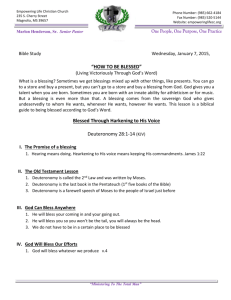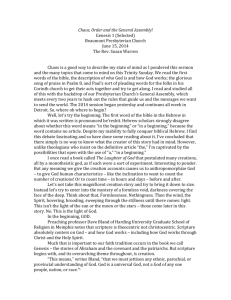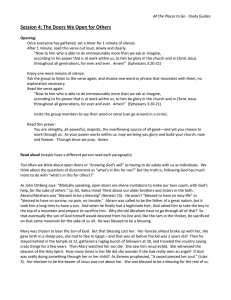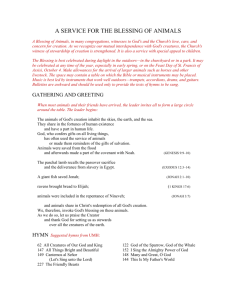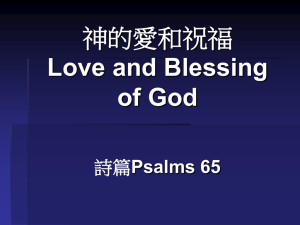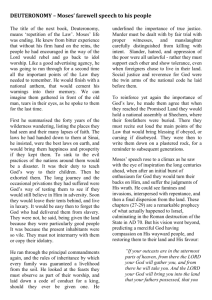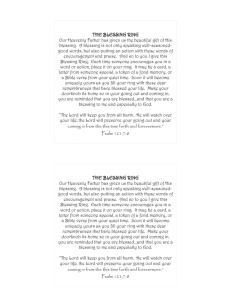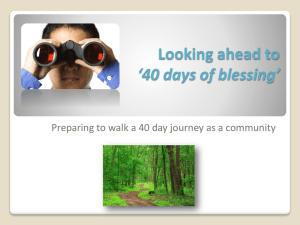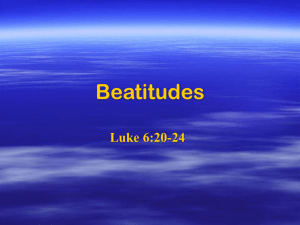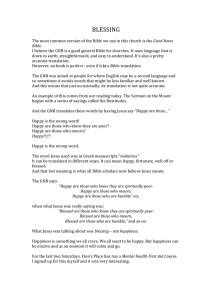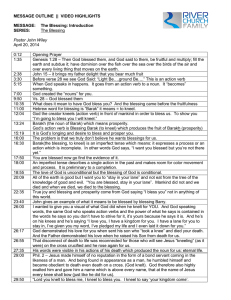Blessed to Be a Blessing Exodus 35:4-9, 36:2
advertisement
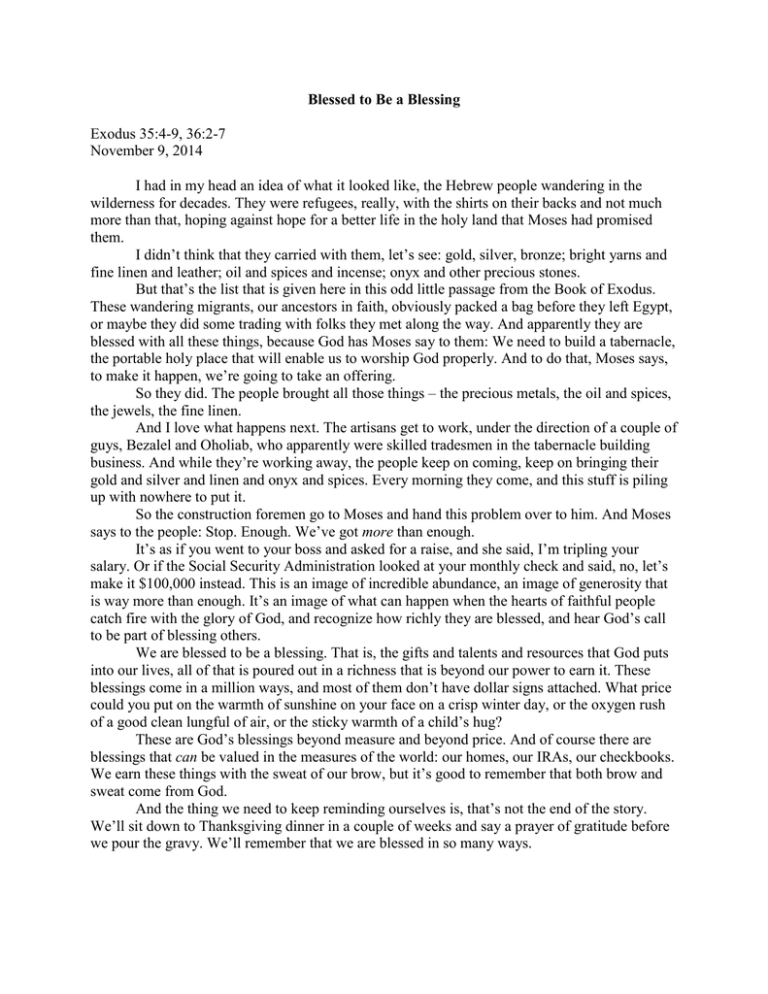
Blessed to Be a Blessing Exodus 35:4-9, 36:2-7 November 9, 2014 I had in my head an idea of what it looked like, the Hebrew people wandering in the wilderness for decades. They were refugees, really, with the shirts on their backs and not much more than that, hoping against hope for a better life in the holy land that Moses had promised them. I didn’t think that they carried with them, let’s see: gold, silver, bronze; bright yarns and fine linen and leather; oil and spices and incense; onyx and other precious stones. But that’s the list that is given here in this odd little passage from the Book of Exodus. These wandering migrants, our ancestors in faith, obviously packed a bag before they left Egypt, or maybe they did some trading with folks they met along the way. And apparently they are blessed with all these things, because God has Moses say to them: We need to build a tabernacle, the portable holy place that will enable us to worship God properly. And to do that, Moses says, to make it happen, we’re going to take an offering. So they did. The people brought all those things – the precious metals, the oil and spices, the jewels, the fine linen. And I love what happens next. The artisans get to work, under the direction of a couple of guys, Bezalel and Oholiab, who apparently were skilled tradesmen in the tabernacle building business. And while they’re working away, the people keep on coming, keep on bringing their gold and silver and linen and onyx and spices. Every morning they come, and this stuff is piling up with nowhere to put it. So the construction foremen go to Moses and hand this problem over to him. And Moses says to the people: Stop. Enough. We’ve got more than enough. It’s as if you went to your boss and asked for a raise, and she said, I’m tripling your salary. Or if the Social Security Administration looked at your monthly check and said, no, let’s make it $100,000 instead. This is an image of incredible abundance, an image of generosity that is way more than enough. It’s an image of what can happen when the hearts of faithful people catch fire with the glory of God, and recognize how richly they are blessed, and hear God’s call to be part of blessing others. We are blessed to be a blessing. That is, the gifts and talents and resources that God puts into our lives, all of that is poured out in a richness that is beyond our power to earn it. These blessings come in a million ways, and most of them don’t have dollar signs attached. What price could you put on the warmth of sunshine on your face on a crisp winter day, or the oxygen rush of a good clean lungful of air, or the sticky warmth of a child’s hug? These are God’s blessings beyond measure and beyond price. And of course there are blessings that can be valued in the measures of the world: our homes, our IRAs, our checkbooks. We earn these things with the sweat of our brow, but it’s good to remember that both brow and sweat come from God. And the thing we need to keep reminding ourselves is, that’s not the end of the story. We’ll sit down to Thanksgiving dinner in a couple of weeks and say a prayer of gratitude before we pour the gravy. We’ll remember that we are blessed in so many ways. But the example of these on-fire givers way out in the desert is, we are called to use those blessings in ways that make a difference in the world. In ways that serve God and build up the body of Christ. We are blessed to be a blessing. That’s a truth that applies to us collectively – we have been blessed, and so we are called to bless the world. And if you look around us and see this beautiful building, this sanctuary full of people who have pledged to love and care for each other, you know that we are blessed as a congregation. We are called to expand the limits of that blessing, to draw it out in ever-larger circles, to extend the love of God that we experience here to others around us. And that truth applies just as well to us as individuals, as families, as households. All of us have to do that budget dance – income in, expenses out – and hope that we’re still dancing at the end of the month. God’s call is an invitation to think in a different way about the money that flows through our lives like a turbulent river. It invites us to be grateful that the river is flowing at all, and it invites us to channel the power of our resources into serving something bigger than our little lives – something as big as growing God’s kingdom on earth. To recognize and celebrate our own blessings, and to in a sense become that blessing for others, to be part of their river. Think, if you will, about the human heart. The heart fills up with blood that comes in through the vena cava, and then it pumps that blood right out again through the aorta. It never stores up that blood for more than a second or so. Blood comes in, blood goes out. The heart receives, then gives; receives, then gives; and it does it about two and a quarter billion times in our lifetime. The same is true for you and me, and for our church, as we consider the lifeblood of our own resources. We receive from God, and then we give; receive and give; receive and give. And the giving always starts with God. So here we are in the midst of our fall stewardship campaign. You should have gotten a little love note in the mail from your hard-working Stewardship Committee this past week, and you’ll get another one this week. They are asking you to be here next Sunday, Stewardship Sunday, and they are asking you to think and pray and reflect and then commit some piece of your own blessings into being a blessing here at church. It’s your choice: You can be a spectator, a consumer, of the worship and fellowship and learning and service that happens here. Or you can be a tangible blessing to this community of faithful people, this body of Christ, right here and right now. You can fill out a pledge card and commit yourself to our work together and to the resources that we need to make it all happen in 2015. And next Sunday you can throw it in the offering plate and join in the celebration that we are blessed and that we can be a blessing to each other and to the world. I look forward to seeing you then! Amen.

